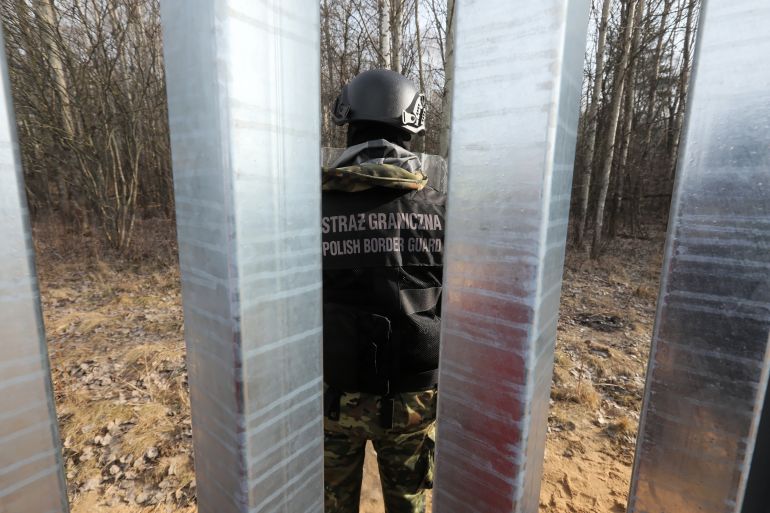Poland completes Belarus border wall to keep asylum seekers out
Poland continues to welcome millions of Ukrainians, while pushing back asylum seekers from the Middle East and Africa.

Poland has completed building a new steel wall at its border with Belarus to curb the flow of undocumented asylum seekers.
The wall, completed on Thursday, is meant to keep out people fleeing conflict and poverty in the Middle East and Africa, who were encouraged by the Belarusian government last year to try their luck in the European Union – as part of its feud with the bloc.
Keep reading
list of 3 itemsWorlds apart: 24 hours with two refugees in Poland
Refugee aid campaigns mushroom in Poland, but tests lie ahead
On Friday, Polish authorities lift a state of emergency along the border that has blocked journalists, rights workers and others from witnessing a human rights crisis.
At the very least, 20 migrants have died in the area’s freezing forests and bogs.
As Poland opened its gates to millions of Ukrainians fleeing Russia’s invasion, work was well under way to build the 353 million euro ($407m) wall, which is 5.5 metres (18 feet) high along 186km (115 miles) of its northern frontier with Belarus.
Human rights activists see a double standard in the different treatment of the neighbouring Ukrainian refugees – fellow Slavs who are mostly Christian, female and white – and those from the distant Middle East and Africa, many of whom are Muslims and male.
“If you give a lift to a refugee at the Ukrainian border you are a hero. If you do it at the Belarus border you are a smuggler and could end up in jail for eight years,” said Natalia Gebert, founder and CEO of Dom Otwarty, or Open House, a Polish NGO that helps refugees.
Belarus had never before been a key migration route into the EU – until its President Alexander Lukashenko began encouraging would-be asylum seekers in the Middle East to travel to Minsk.
Soon, people from Syria, Iraq, Yemen, Afghanistan and African countries flocked to the EU’s eastern edge, entering Poland and neighbouring Lithuania and Latvia.
EU leaders accused Lukashenko of waging “hybrid warfare” in revenge for the bloc’s sanctions over the regime’s treatment of dissidents. Poland’s government says Russia is complicit, given Lukashenko’s alliance with Russian President Vladimir Putin.
Though migration slowed in the winter, people continued to try to enter the EU through Poland, a route seen as less dangerous than crossing the Mediterranean Sea, where many have drowned in past years, Gebert said.
A Human Rights Watch report this month said Poland “unlawfully, and sometimes violently, summarily pushes migrants and asylum seekers back to Belarus, where they face serious abuses, including beatings and rape by border guards and other security forces”.
Amnesty International has also detailed serious human rights abuses.
While some Poles support the government’s tough stance, many border region residents have throughout the winter and spring sought to help refugees trapped in the forest, several requiring medical help.
A play that premiered in Warsaw this week, “Responsibility”, asks how Poland can accept millions of Ukrainians while withholding help to thousands of others. One character asks: “Why does the Polish state demand that a child from Aleppo sits in a bog in sub-zero temperatures and withhold the aid it gives the child from Mariupol?”